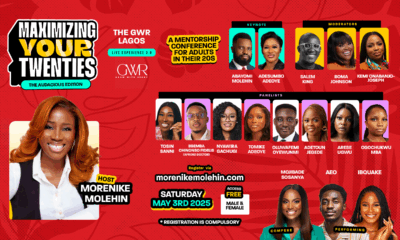Features
Smart Money Woman with Arese Ugwu: 3 Lessons From My East African Book Tour
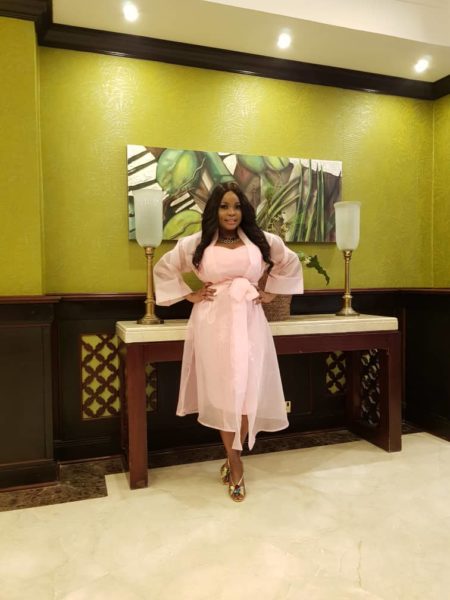 ‘You must kill a goat!” My South African friend Samke says, every time we discuss the obstacles that arise during my book tour. She says that I must have offended my ancestors because these setbacks are not normal. I always cry-laugh when she says this because it’s hilarious, but I disagree. Her perspective is only different because she is South African and she’s used to structured situations where, if you plan properly, things mostly work out without incident. However, I am Nigerian and to be a Nigerian entrepreneur you have to wake up ready to eat problems for breakfast and be nimble and creative enough to overcome obstacles.
‘You must kill a goat!” My South African friend Samke says, every time we discuss the obstacles that arise during my book tour. She says that I must have offended my ancestors because these setbacks are not normal. I always cry-laugh when she says this because it’s hilarious, but I disagree. Her perspective is only different because she is South African and she’s used to structured situations where, if you plan properly, things mostly work out without incident. However, I am Nigerian and to be a Nigerian entrepreneur you have to wake up ready to eat problems for breakfast and be nimble and creative enough to overcome obstacles.
I remember the exact moment I decided that I was going to embark on the journey to take my book ‘The Smart Money Woman’ to East Africa. I was getting my make up done by my favorite makeup artist, Patience from House of Tara Abuja. I’m sure she thought I was a little insane because I started talking to myself, as I do when I have a brain wave. It was already April and I had been thinking about the goals I had set for myself at the beginning of the year and assessing my progress.
One of my goals was to go on an East African Book Tour in 2018. My book was first published in 2016 and I had taken the book tour across Nigeria and to several other cities in countries like Ghana, South Africa and the United Kingdom but not East Africa. Countries in East Africa seemed so foreign to me. However, it became clear that it was a market that needed to be explored because the analytics from my Instagram page @smartmoneyarese indicated that I had an increased following in countries like Kenya and Tanzania. I was also getting a substantial number of emails from women in these countries telling me the impact the book had on them book, even though it wasn’t sold in any of those markets. I have the power of piracy to thank for this mixed blessing.
It was a big audacious goal because with limited resources and only knowing about three people in East Africa, who were primarily in Tanzania, I didn’t know how I was going to succeed but I knew I would figure it out step by step.
The East African Book tour looked super glamorous on Instagram but it was hard; there were many obstacles and many lessons.
The business model
‘What’s the point of a book tour’? I get asked this a lot. I have two main goals: first of all it’s a brand building exercise to establish a pan-African brand; and second, to make a profit in foreign currency.
The goal is to increase revenue and find creative ways to decrease costs. The revenue streams are ticket sales to the events, book sales, online course sales and one-on-one strategy sessions. The obvious costs are airline tickets, hotel accommodation, logistics and media.
Outside Nigeria, the book is sold at a premium of $25. Ticket sales to the events vary depending on the demand in each country. For example in Kenya it cost $50, excluding the cost of the book and in Tanzania it cost $50 for a ticket and this was inclusive of a signed copy of the book. The average attendance for each event was 100 excluding Uganda.
Brand partnerships
Price is what you pay, value is what you get. Brand partnerships are a great way to subsidize the costs of the book tour. Finding brands that can give you what you want in exchange for showcasing their goods and services on the tour in a way that converts your audience into their customers. This is tough but the key is to seek opportunities to exchange value with brands that buy into your long-term vision.
On this book tour, I’ve had the privilege of partnering with brands like, Diamond and Pearls Travel, Samsung Nigeria, designers like LadyBiba, Adeysoile, CpwomanLagos who provided fabulous outfits for my events and media appearances in east Africa. This helped the brands not only sell more units in Nigeria but creates brand awareness in more countries.
For example, my travel partner was Diamond and Pearls travel, an agency that has been successful in creating affordable travel packages. I noticed them on Instagram a few years ago and fell in love with their creative approach to travel, especially the way they package African travel.
When I first pitched the idea to Wonu Lamidi, one of the co-founders of Diamond and Pearls Travels about sponsoring the East African book tour by covering a substantial part of the travel costs, for 5 countries in 30 days, she was skeptical. However, I convinced her and her husband to see it as a marketing cost that would lead to a conversion of my smart money community to their customers as well as leverage on my relationships for publicity. The tour is over now and they’ve recouped a significant amount of the costs in sales. We both got what we needed. Optimal exchange of value!
I also somehow convinced the Tanzanian chapter of EO (Entrepreneur’s Organization) to cover the cost of my weeklong hotel stay in Dar es Salem in exchange for speaking at a Power breakfast they hosted.
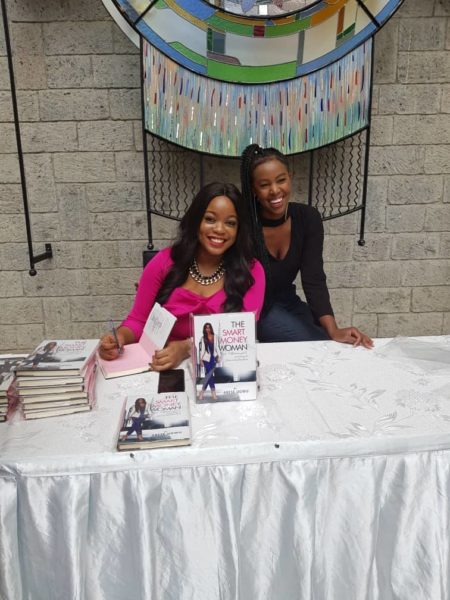 Also, when my trip to Namibia got postponed, I somehow convinced the managing director of the Avani Pemba beach hotel in Mozambique who I had just met to let me stay in a sea facing $400 a night room for a week at a discounted rate of less than $100 breakfast inclusive in exchange for influencer marketing on Instagram. He even threw in a couple of nights for free after I hooked him up with Wonu from Diamond and pearls to channel some Nigerian customers his way. See exchange of value!
Also, when my trip to Namibia got postponed, I somehow convinced the managing director of the Avani Pemba beach hotel in Mozambique who I had just met to let me stay in a sea facing $400 a night room for a week at a discounted rate of less than $100 breakfast inclusive in exchange for influencer marketing on Instagram. He even threw in a couple of nights for free after I hooked him up with Wonu from Diamond and pearls to channel some Nigerian customers his way. See exchange of value!
Finding the right collaborators
A book tour is only as powerful as its collaborators. If you think about it, you have to be a real life crazy person to hop on a plane and go to countries you’ve never been to before to do business with relative strangers. It’s beautiful when it works out but a nightmare when it doesn’t.
The first time I took this leap of faith was when I took the book tour to South Africa. I had never really considered the market potential of other African markets asides from our next-door neighbor Ghana, until an encounter I had with a South African girl Samke Mhlongo on social media in 2016.
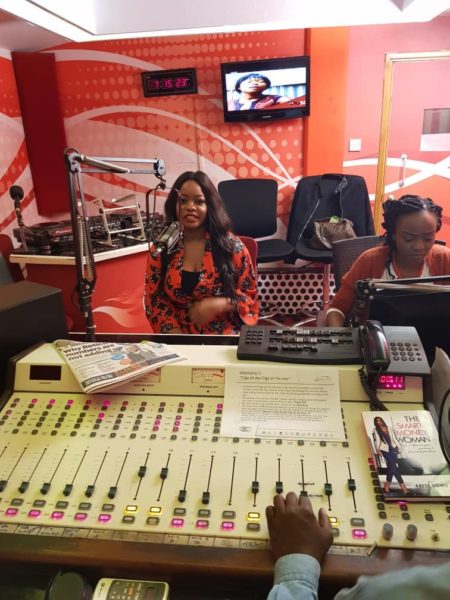 She read my book and reached out to me to bring my book tour to South Africa. At first my reaction was ‘ she must be joking’. Does a stranger think I’m just going to get on a plane and come to a foreign country because she likes my book? I laugh in bini. Other thoughts included ‘I don’t have an audience in South Africa’, so this would be silly and ‘who is going to pay for this’? Taking books to South Africa seemed like a very expensive venture. I raised my concerns but I quickly learned that No is a word that Samke doesn’t understand. Her persistence led to a successful South African Book tour with media interviews on TV and radio (SABC 1, Business day TV, Power FM, Fresh breakfast and many others). It led to Dr Judy Dlamini, one of the most successful black South African women hosting the Book Launch at Luminance, a prestigious high-end store in Hyde Park.
She read my book and reached out to me to bring my book tour to South Africa. At first my reaction was ‘ she must be joking’. Does a stranger think I’m just going to get on a plane and come to a foreign country because she likes my book? I laugh in bini. Other thoughts included ‘I don’t have an audience in South Africa’, so this would be silly and ‘who is going to pay for this’? Taking books to South Africa seemed like a very expensive venture. I raised my concerns but I quickly learned that No is a word that Samke doesn’t understand. Her persistence led to a successful South African Book tour with media interviews on TV and radio (SABC 1, Business day TV, Power FM, Fresh breakfast and many others). It led to Dr Judy Dlamini, one of the most successful black South African women hosting the Book Launch at Luminance, a prestigious high-end store in Hyde Park.
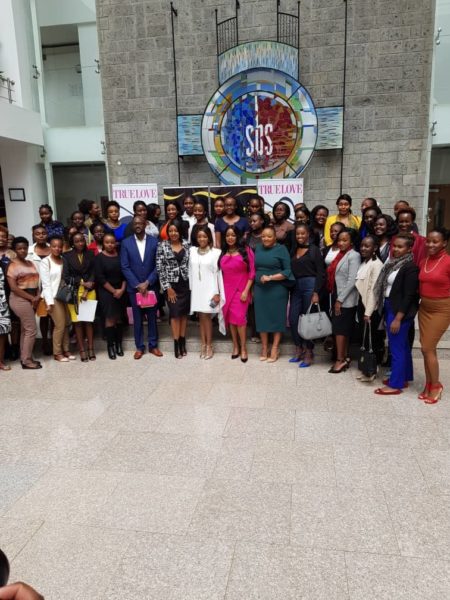 The success of the South African book tour gave me a pan African perspective and the confidence to replicate the model in other African markets. Samke became the model for other collaborators.
The success of the South African book tour gave me a pan African perspective and the confidence to replicate the model in other African markets. Samke became the model for other collaborators.
For the East Africa book tour I created a pitch deck to send to potential hosts with requirements of what it entails to host a Smart Money Woman book tour, to ensure that our goals are aligned and that we work with quality partners.
These are typically brilliant women who are power players in their various industries and buy into the vision of The Smart Money Woman brand. They were willing to leverage their resources and relationships i.e. (ability to secure media interviews, venue, hotel accommodation etc.) to bring the book tour to life. The exchange of value here could be a variety of things, profit sharing for the events, access to the Nigerian market for their own brands or collaboration on future projects.
With the help of my hosts Nahida Behgani, Nana Wanjau, Caroline Mandi, Irene Kiwia and Nisha Kanabar the east African book tour was a success. Between them, the impossible was achieved. In Uganda, Nahida provided a venue, The Square as well as distribution at her mall store Definition in Uganda. In Kenya Nana Wanjau (Branding Beyond Borders) and Caroline Mandi (True Love Magazine) got the spectacular Strathmore Business School as the venue, Barclays as a sponsor, a car service the duration of my stay and media interviews in everything from print, to TV and radio. In Tanzania, Nisha Kanabar (Industrie Africa) used secured The beautiful Sea cliff Hotel as the venue for the main event, introduced me to the Tanzanian chapter of the Entrepreneur’s Organization who paid for my hotel stay in Dar es Salem, provided a car and driver to make sure I could get around comfortably. Irene Kiwia, is just a force! She organized all the media appearances in Tanzania (I honestly thought I was going to break because they were a lot) as well as handled the logistics of the event and distribution of books.
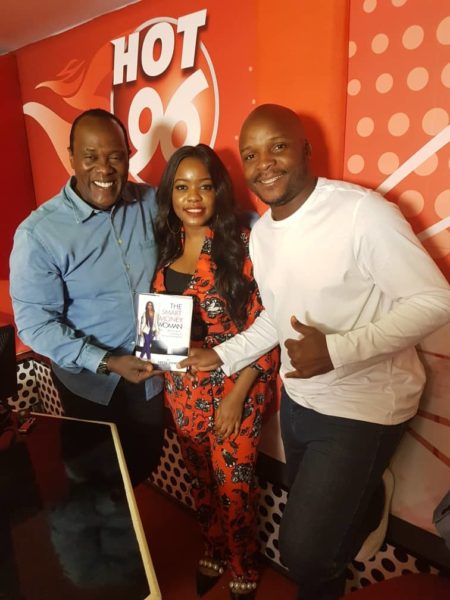 The most remarkable thing is, the only thing these five women have in common is that this time last year we were strangers but have become sisters and business partners.
The most remarkable thing is, the only thing these five women have in common is that this time last year we were strangers but have become sisters and business partners.
My goal is to be a pan-African brand on a global stage and this experience taught me that if you commit to a vision you could figure everything else out, the process, the people, and the business model. You have to be resilient. You have to ask for help when you don’t know, you have to be open minded about new cultures, take risks and enjoy the adventure of not knowing.
There were a lot of wins but there were also many setbacks. I chopped a lot of No’s during this process. Pitching to potential partners and sponsors can be very difficult. For every Yes I got I probably got ten No’s. Sometimes they felt like a personal rejection, but I’ve learned to get over myself and keep it moving. On this journey I learned there was power in resilience and that God rewards a stubborn heart. A winner was once a dreamer that never gave up.




